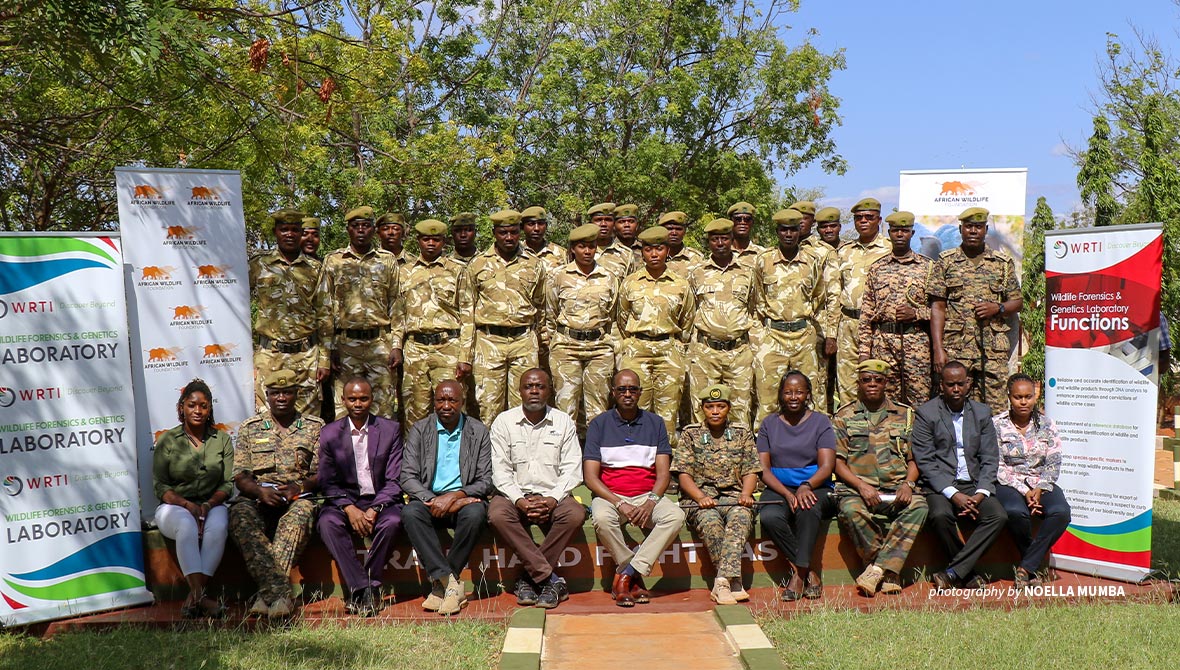AWF and KWS Conduct DNA Forensics First Responder Training for KWS Rangers
General Inquiries
Tel:+254 711 063 000
Ngong Road, Karen, P.O. Box 310
00502 Nairobi, Kenya

From June 20-23, 2023, the African Wildlife Foundation (AWF) in collaboration with Kenya Wildlife Service (KWS) conducted the DNA Forensics First Responder to Wildlife Scenes of Crime Training. Funded by the U.S. Bureau of International Narcotics and Law Enforcement Affairs (INL), this training was conducted at the KWS Law Enforcement Academy (LEA) in Manyani, Taita Taveta County. This training is part of AWF’s Wildlife Judicial and Prosecutorial Assistance Training series.
The training targeted 32 frontline rangers working in KWS national parks and reserves across the country, equipping the wildlife law enforcers with knowledge and skills in the proper handling of DNA evidence. Over the years, KWS has been facing numerous challenges in managing wildlife crime scenes such as inadvertent scene tampering and contamination by first responders, lack of scenes of crime equipment, and a shortage of gazette scene of crime officers.
“Criminals are continuously changing their modus operandi due to the lucrative nature of illegal wildlife trade which has been ranked as the fourth most lucrative transnational organized crime after drug, arms, and human trafficking. I therefore call upon all the participants to seize this opportunity to engage openly and make maximum use of the facilities who have vast knowledge in their various areas of expertise,” noted Elema Saru, Head of Investigations at KWS as he officially opened the training.
“Illegal wildlife trade is a pressing issue. Its dynamic nature continues to pose major challenges not just in Kenya but in the whole world. This training aims to address this challenge head-on [by employing] DNA forensics, a crucial tool in identifying and prosecuting wildlife offenders. By training you to be proficient first responders to wildlife crime scenes, we will present watertight evidence in the courts. In the long term, we are strengthening our fight against wildlife crime,” said Ernest Agina, AWF’s Cybercrime Investigations Manager in his opening remarks.
This groundbreaking training was conducted both theoretically and practically and was administered by facilitators drawn from AWF, KWS, and the Wildlife Research Training Institute (WRTI). It covered these modules: introduction to DNA forensics; introduction to crime scene investigation; and handling DNA forensic evidence and admissibility of DNA forensic evidence.
It is expected that the trained rangers will share the knowledge acquired with their colleagues in their stations across the country. The skills and expertise acquired will also improve the overall performance of the stations and in the long term, reducing wildlife poaching and trafficking levels in the country.
“This training was very much needed as it is very handy in scene of crime management. It came at the right moment as it not only equipped our first responders with the requisite knowledge and skills to secure crime scenes and DNA evidence but will also contribute significantly to combatting illegal wildlife trade along the Kenya-Tanzania border,” said Abdi Doti, Commandant, KWS LEA.
AWF is committed to investing in building the capacity of frontline wildlife law enforcers in the fight against illegal wildlife trade in the continent, and partnerships with like-minded organizations like KWS are paramount in the conservation of Africa’s iconic wildlife and the ecosystems they require to thrive.